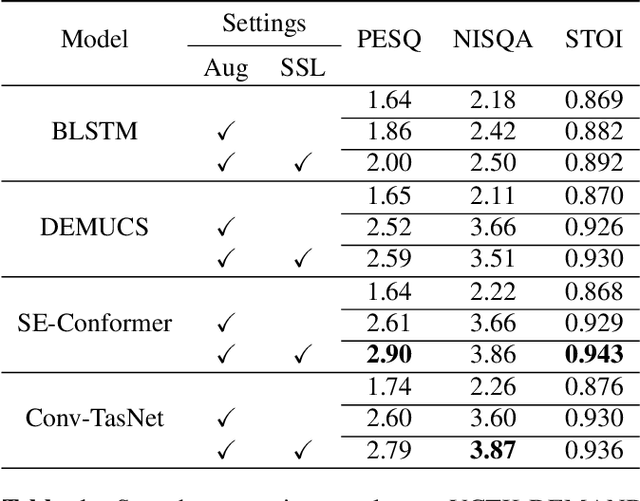Jaeuk Byun
An empirical study on speech restoration guided by self supervised speech representation
May 30, 2023



Abstract:Enhancing speech quality is an indispensable yet difficult task as it is often complicated by a range of degradation factors. In addition to additive noise, reverberation, clipping, and speech attenuation can all adversely affect speech quality. Speech restoration aims to recover speech components from these distortions. This paper focuses on exploring the impact of self-supervised speech representation learning on the speech restoration task. Specifically, we employ speech representation in various speech restoration networks and evaluate their performance under complicated distortion scenarios. Our experiments demonstrate that the contextual information provided by the self-supervised speech representation can enhance speech restoration performance in various distortion scenarios, while also increasing robustness against the duration of speech attenuation and mismatched test conditions.
Diffusion-based Generative Speech Source Separation
Nov 02, 2022Abstract:We propose DiffSep, a new single channel source separation method based on score-matching of a stochastic differential equation (SDE). We craft a tailored continuous time diffusion-mixing process starting from the separated sources and converging to a Gaussian distribution centered on their mixture. This formulation lets us apply the machinery of score-based generative modelling. First, we train a neural network to approximate the score function of the marginal probabilities or the diffusion-mixing process. Then, we use it to solve the reverse time SDE that progressively separates the sources starting from their mixture. We propose a modified training strategy to handle model mismatch and source permutation ambiguity. Experiments on the WSJ0 2mix dataset demonstrate the potential of the method. Furthermore, the method is also suitable for speech enhancement and shows performance competitive with prior work on the VoiceBank-DEMAND dataset.
 Add to Chrome
Add to Chrome Add to Firefox
Add to Firefox Add to Edge
Add to Edge